

Art of Okami - The Art - Change The World
The other half of the Okami experience -- the one that doesn't get nearly the share of glory enjoyed by its remarkable visuals and action -- is the game's rich story and dialogue. With so much of the game loosely based on mythological characters from Japanese folklore, making the game palatable for the North American masses is no small task. But with Capcom localization producer David Crislip at the helm, things are in good hands. Simultaneously juggling a huge project like Okami's epic script while hustling to keep Dead Rising's voice acting and dialogue on target isn't a job for the faint of heart, but Crislip has done an outstanding job with both games.
Okami demands a lighter touch than Dead Rising because dialogue isn't the only thing in need of translation. Names and naming are a concern as well, as neither Crislip nor the localization team wants to rob the original Japanese version of its character. But they remain cognizant of the fact that the average American might have trouble with some of the more complex Japanese names. So where do they draw the fine line? 1UP gets to the bottom of things one fine afternoon in Tokyo with Crislip.
1UP: Hey, David. Thanks for taking the time to meet with us. What are you working on now?
David Crislip: Well, we're doing the "native check" on Okami now, so we're close to the finish line.
1UP: What's the "native check"?
DC: That is just once the game has the English text in it, we have a native speaker of English play the game through and make sure everything makes sense. Since Japanese doesn't have plural and singular, we have to actually play the game through to make sure it's making sense.
1UP: How many instances of nonsensical text do you catch?
DC: In Okami, maybe not a lot, maybe a couple of dozen. But when all is said and done, we find a few hundred things to correct -- which is par for the course, I guess. There's 1,500 pages of text in Okami, which I don't know for sure, but I'd wager a guess that it's the biggest game Capcom has done, text-wise? although it's possible one of the Breath of Fires or something is up there.
1UP: What was the process of localizing Okami like, when compared to, say, a Mega Man game?
DC: Basically, because there were so many characters in the game and they all link up in different ways -- there's a lot of characters and there's a lot of situational and conditional text they have, like if you've spoken to person A in an earlier part of the game, and you talk to person B, they're going to say something different than they had before. So we had to get a basic overview of everything linked up, first of all.
And the naming was really difficult. We had to go through the list of all the names and all the characters and all the items. We had two choices, really: We could totally Westernize it and just give them all Western names, or we could leave it 100 percent Japanese and alienate a large part of the crowd because they wouldn't be able to pronounce everything properly. We kind of aimed for the middle here, and what we did was we took existing names and shortened them.
1UP: Give us an example?
DC: Like Kushinata, which is one of the characters you meet in Kamiki Village, we shortened her to Kushi. There's a boy named Mushikai, we just called him Mushi. We tried to maintain the original flavor without making it difficult to pronounce.
1UP: I think gamers can live with that. You'll still get the really anal hardcore type who gets upset about everything.
DC: [Laughs] There's no pleasing everyone. We tried to go for the broadest audience possible.
1UP: Were there any pop culture references or Japan-centric in-jokes that Western audiences might not get and say, "I have no idea what this means"?
DC: Yeah, the game was chock full of that. What we did [was to try] to maintain anything that was an actual story that people could look up. We tried to leave the naming as close as possible that people could look up on the Internet, or in their local library.
1UP: Were there anything of a scandalous nature that you had to adjust? Sometimes Japanese scripts involve underage characters who might be involved in things that North Americans would get all bent out of shape over, whether it's language-related, sexually-related, alcohol-related, and so on.
DC: Nothing major. There's a minor pseduo-nude scene later in the game that involves an adult. I'm not going to say who it is, as it would actually kind of spoil the game for you. There's a little bit of nudity...
1UP: Big, sumi-e polygonal nudity?
DC: Yeah, basically. [Laughs] And the costume of Sakuya, her costume's a little suggestive. Because she's kind of peach-themed, and the Chinese image of the peach is the upside-down heart, so her breasts are exposed and her rear is exposed, but since it's so stylized, we still squeak by with a T-rating.
1UP: Is there anything you had to physically change within the game? Because you can't localize out a short skirt.
DC: We didn't have to change anything. The only thing we would have had to change, and this is not related to possible offensive stuff, but there's one puzzle in the game that involves having the player draw something specific, and one of them is a Chinese character. A Japanese person would have no problem with it, they're very familiar with it, but the team added a little animation of the thing being drawn in the proper order to give [Western] players a clue. They added a few other hints and additions, but nothing major needed to be change.
Click to see all screens.
1UP: So nothing was removed.
DC: Still in the game, they just added a contextual hint to make it easier for people to understand.
1UP: So they added the kanji order.
DC: Exactly.
1UP: So people can learn how to genuinely write one Chinese character.
DC: [Laughs] Yup.
1UP: What other sort of things went on behind the scenes in localizing Okami?
DC: Here's a few tidbits. Issun the character has a specific nickname for Amaterasu in the Japanese version where he calls her -- or I should say "him." I shouldn't say her. Actually that's one thing I should mention? R&D is very adamant about making Amaterasu genderless, which made localization very hard. Because we use pronouns a lot: he, she.
1UP: And Amaterasu is supposed to be a goddess.
DC: Yeah, and in traditional lore, the Amaterasu of those stories is definitely a sun goddess. But I guess the point Kamiya was trying to make is that this character is called Amaterasu, but it's not necessarily the Amaterasu. Because if you go by proper legend, Susano is Amaterasu's brother, and Tsukiyomi, which is actually a sword in the game, is one of their siblings.
1UP: So it's an embodiment, and genderless Amaterasu...
DC: Right, they're taking the names and general themes, but it's not necessarily the Amaterasu, it's a character named Amaterasu. For the European versions, I think they'll have to go ahead and make it a female because it'll be too hard to write around that. But for English, that was really difficult because we couldn't use he or she, and we didn't want to use "Amaterasu" every time we mentioned the character's name.
1UP: And you didn't want to use "it."
DC: Exactly. So we used "the wolf," "the god," things like that. There were ways around it, but it wasn't easy. But speaking of that, it leads me to what I was saying about Issun. In the Japanese version, Issun refers to Amaterasu as Ammako, and we were struggling with what to do with that in English. Adding 'ko" to the end of something doesn't make sense to an English speaker. But Kamiya actually thought of "Ammy" himself so people wouldn't mispronounce it as "Amy." And feeling-wise, it's very, very close to the way it would sound to a Japanese speaker.
1UP: Did the development team have any specific requests?
DC: They did, yeah. Kamiya certainly did. He's kind of a perfectionist. He suggested a lot of things. That's how we came up with calling the whole country "Nippon." In the Japanese version it's called Nakatsu-kuni, which is just too long, and it's really hard to pronounce. We were going to call it Yamato at one point, which is another ancient word for Japan, but there was something else in the game called Yamato, so we had to scratch that.
1UP: I don't know how close you got to work with him, but I when I met with him, he seemed very sincere about his work. What's it like working with him?
DC: It was a pleasure. I think a lot of people would say that about him. I don't know if that guy's ever taken an IQ test, but I wouldn't be surprised if he's a bona fide genius. The way he designs dungeons, the way he thinks of how characters would interact, and the way the story flows? there's little seeds planted early on that come to fruition at the end.
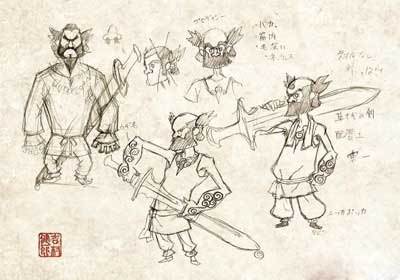 |
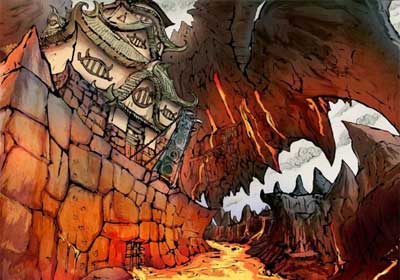 |
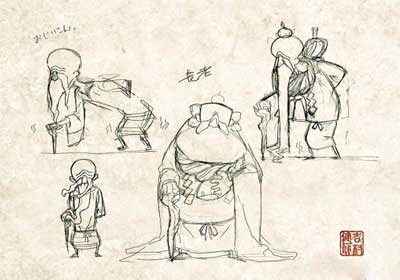 |
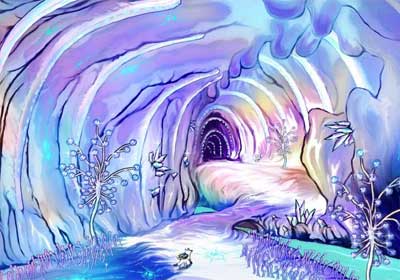 |
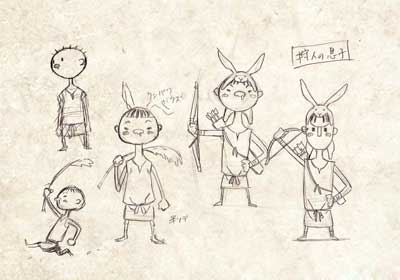 |
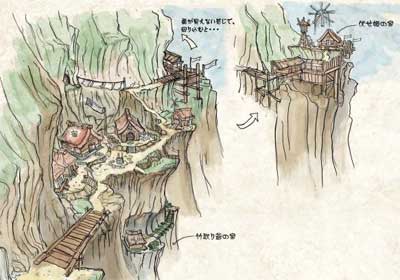 |
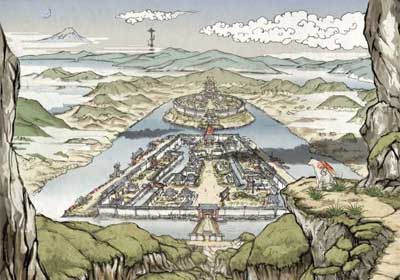 |
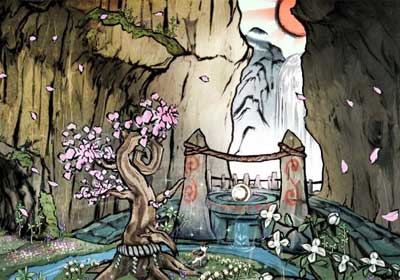 |




